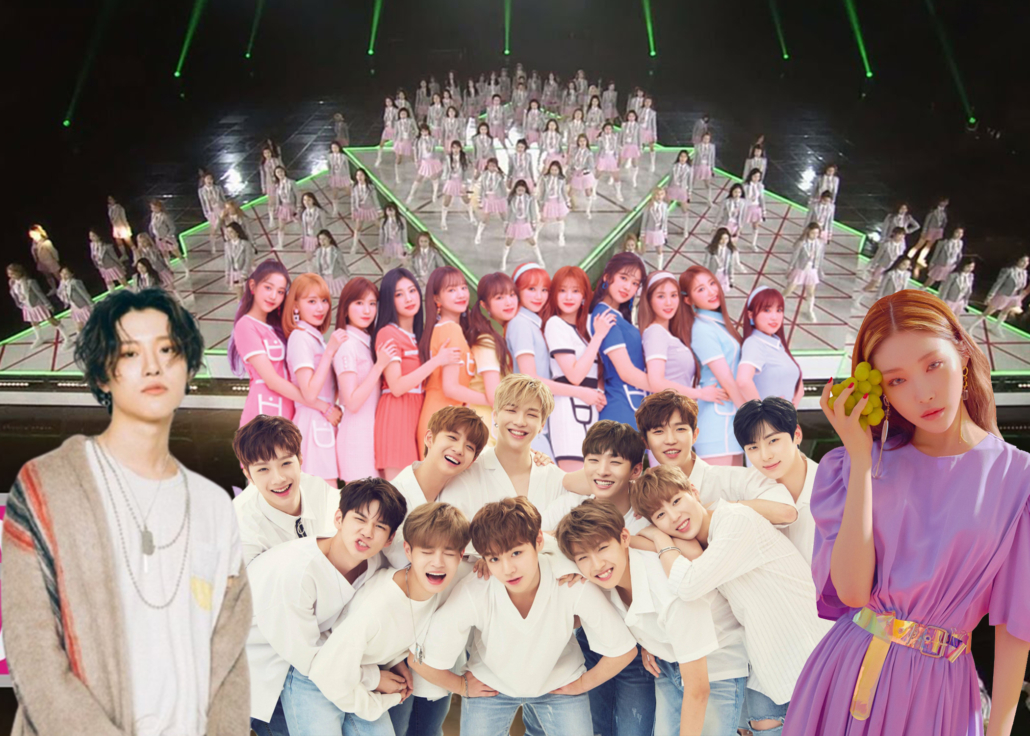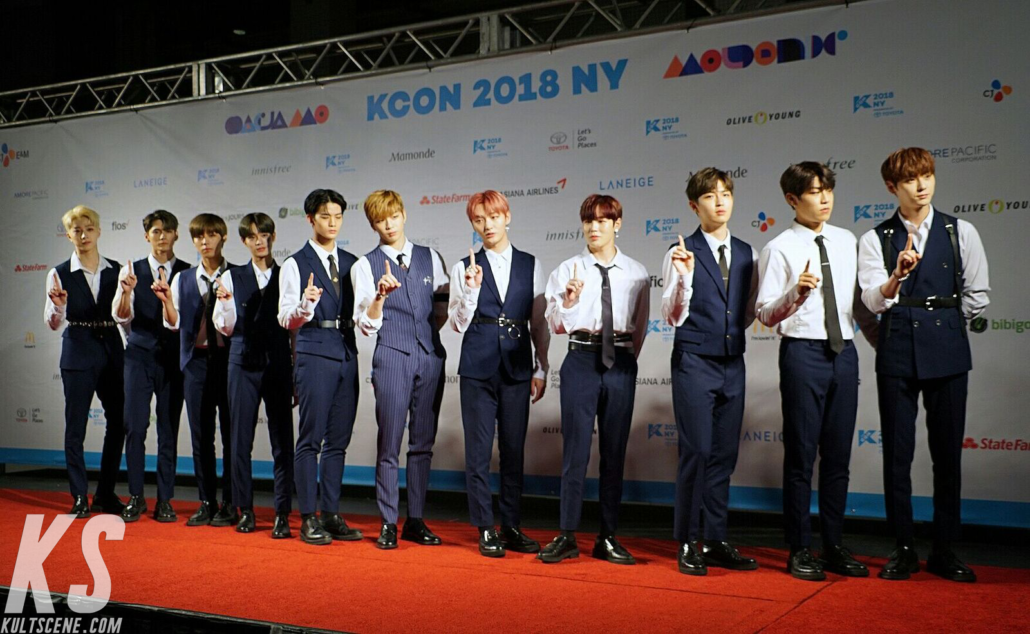Looking back at the legacy of K-pop competition show ‘Produce 101’
By Rachel Saywitz
The first appearance of the bubbly trainees on Mnet’s competition program, Produce 101, was a jarring sight to see. At the start of their debut performance, aired in December 2015 on M! Countdown, 20 young girls appeared in a giant stadium synchronously dancing in a pyramid formation, wearing the same school girl uniform, and singing in unison to the show’s theme song, “Pick Me.” Soon, they were joined by another 20-or-so contestants, floating in on a giant triangle stage. Then another triangle of girls arrived, and another, until finally the stadium was filled with 101 smiling, hopeful trainees, eyes affixed on any chance to get screen time, to show their soon-to-be producers how worthy they were of being an idol singer.
The newly sprung competition show was gaining notoriety even before its first episode — which aired five years ago on January 22 — with its promise to whittle down 101 K-pop idol trainees to a final 11 who would debut as a temporary girl group for a few months before returning to their respective agencies.
South Korea was no stranger to singing competition shows at the time of Produce 101’s airdate, and in fact had been featuring a wide variety of programs starting in the 2010 like Superstar K and Immortal Song. Globally popular idol groups got their start through label-run reality shows as well: TWICE through JYP’s Sixteen, Monsta X through Starship’s No.Mercy, and Sorn of CLC through Cube’s K-Pop Star Hunt.
However, what made Produce 101 and its consecutive seasons so drastically different from other programs was twofold. First, the competition was a multi-label endeavor, allowing collaboration between entertainment agencies both big and small. Second, and perhaps most importantly, the final idol group’s lineup would be expressly determined by fans of the show (called “national producers”), breaking tradition with how most groups are traditionally formed. Or at least that’s what the show’s creators wanted us, the viewers, to believe.
Also on KultScene: BEST K-POP ALBUMS OF 2020
It was no surprise, though, that at the time of its original airing, Produce 101 went on to be a ratings smash during its entire three-month run. The show offered not just fan voting, but an in-depth look into K-pop’s infamous trainee ecosystem, as contestants were judged harshly on their dance and vocal abilities. Given that the competition was a reality show first and foremost, editors of the program selectively highlighted contestants that could deliver the best storylines. Perhaps the best example would be the trajectory of Kim Sohye, a trainee at an acting agency who had come to the competition expecting to fail miserably. Despite being an objectively bad singer and dancer, the show’s focus on Sohye’s desperate drive to succeed and her continual improvements pushed her forward to rank in fifth place at the show’s finale, making it into the debut team.
There was also an intensely reinforced hierarchy that proved to be a main tenet of the show’s voting system. Pressure was placed on the trainees to earn the coveted “center” position in group challenges, where they’d dance in the middle of formations and be able to perform the song’s “killing part,” gaining them more visibility in performances and a chance to earn more votes. And while 11 girls would form the debuting girl group based on a last round of voting in the show’s finale, the highest scoring girl would be deemed the group’s “center,” in all future promotions. Jeon Somi, at the time a trainee from Big 3 agency JYP Entertainment, enjoyed success from her win as “center” in Produce 101’s first season and was arguably the most popular of her group mates at the time.
The group that formed from Produce 101’s final episode, I.O.I, also quickly achieved commercial success, landing numerous lucrative CF deals and winning coveted “rookie of the year” awards. Yet the girls of I.O.I, as immensely popular as they were, promoted for only eight months, which was all their contract allowed for. Additionally, the group’s contract with YMC Entertainment — which was tasked with handling all of I.O.I’s promotional activities — still allowed for members to participate in their respective agency’s activities, which meant some girls promoted in two groups simultaneously. I.O.I’s whirlwind of a promotion period ended almost as quickly as it came, but it set the groundwork for the Produce series to expand and extend its reach.
Produce 101’s second season aired in 2017 and produced the boy group Wanna One, which was even more popular than its first. In the show’s finale, more than 10 million votes were cast by national producers, a number equivalent to around one-fifth of Korea’s population. Learning from the past, Mnet extended the group’s temporary contract from eight months to two years, and didn’t allow members to be active in promotions with their own agencies. Wanna One, led by the group’s “center” Kang Daniel, was massively popular from the jump, becoming only the third Korean group to sell a million copies of their debut album since 1992. Also experiencing a burst in popularity was the boy group NU’EST, who had debuted in 2012 to positive reception before fading to the background over the next four years due to mismanagement. When four of its members appeared on Produce 101 and advanced to the show’s finale, their previous, underrecognized music shot to the top of Korean music charts (only one of those four, Hwang Min-hyun, debuted in Wanna One).
The Produce series continued its winning streak with its third season titled Produce48 in 2018, bringing in female trainees from Korea and idols from Japan’s AKB48 J-pop juggernaut to produce an international, multi-lingual girl group. While the show itself suffered lower ratings, the resulting final group, IZ*ONE, has lived up to the critical and commercial success of I.O.I and Wanna One, and promotes both in Korea and Japan as one both nations’ top girl groups. IZ*ONE, which is still actively promoting, signed a two-and-a-half-year contract, a notable amount of time to be active in a temporary group and unable to promote with original agencies. Yet the misgivings of Mnet’s contract negotiations were largely overlooked due to Produce’s domination in the music industry, until 2019.
The fourth season of Produce, titled Produce X 101, was shaping up to be a monumental event. Mnet had announced the winning boy group would have a five year contract as a way to concentrate on both group and individual activities, and a new voting mechanic in the show’s format, where the trainee with the highest amount of accumulated votes by the end of the season would join the final group as its 11th member. The group, X1, was already breaking records in their debut album sales and charting worldwide when their promotions came to a sudden halt. Fans noticed discrepancies in the final vote tallies after the season finale and filed a lawsuit against Mnet. Police then discovered evidence that the votes for X1’s final lineup had been rigged, causing the group to disband a mere five months after their debut.
Further investigations revealed that all four seasons of Produce 101 were guilty of vote manipulation on the part of the show’s producers and agency representatives. The news was a shock and a betrayal of the series’ core ethos in giving power over to the fans. In the end, the show’s PD (producing director) Ahn Joon Young and CP (chief producer) Kim Yong Bum were sentenced to two years in prison on May 29, 2020. Produce 101, much like the lifespans of the groups it produced, had met a swift and unceremonious end.
Also on KultScene: 50 BEST K-POP SONGS OF 2020
It’s ironic that while the groups that came out of the Produce series dominated the Korean idol scene, many members of these groups came from relatively small agencies, most not standing a chance of success if they had debuted normally. This is what made Produce 101’s impact on the industry so captivating: it was, in some ways, able to even out the playing field. Kim Chung-ha, arguably the most successful idol out of her former I.O.I members, put her small agency MNH Entertainment on the map when she debuted with the group. Because of her musical achievements, the company has been able to expand, bring on more trainees, and debut more artists. Similar stories abound with other Produce idols, such as Kim Jae-hwan from Wanna One — who started on Produce with no agency backing — and Kang Daniel, who gained enough industry cred to break off from his agency and start his own company after Wanna One’s disbandment. While the Korean music charts are still heavily influenced by artists from large agencies like Big Hit, JYP, and SM, there’s a noticeable difference in the diversity of artists and labels gaining popularity, both domestically and abroad.
However, Produce’s vote rigging scandal in 2019 brought to light the harsh realities of the program, and the impact it had on its trainees. The show had already gone under much criticism in the past for the way in which it was edited, shining harsh lights on underperforming contestants and portraying trainees who had difficulty learning routines as lazy and selfish. Constructed storylines are nothing new on reality television, but there was an insidious factor to putting so much national attention on young trainees, many of whom were minors. One contestant who was often shown performing poorly on Produce’s second season deleted his Instagram due to the amount of hate comments he was receiving from viewers.
This conversation leads to another way in which trauma was inflicted on trainees, by emotional and verbal abuse from the show’s mentors. One could easily point out that criticism is to be expected in the K-pop training system, but to see it play out for entertainment on television made for an uncomfortable watch. It made viewers — especially foreign ones— confront the realities that these idols in training had to experience in order to become the shiny, blemish-free groups dominating the K-pop scene we stan. On the show, contestants were expected to dance and sing to routines flawlessly in less than a week, and were chastised by mentors when they would fail to do so. Moreover, the show would then highlight trainees who, seemingly bolstered by their mentors’ shouting, would spend all night practicing and end up executing the performance much improved. Segments like these promoted unhealthy behaviors and ultimately did nothing to give trainees the actual mental support that they needed.
Yet despite these flaws, I, like many others, watched every season of Produce 101, eagerly anticipating new episodes and live performances that I would then rewatch endlessly. Even now, a small part of me wants Mnet to announce a new season so I can have my thirst for more Produce content quenched. I never enjoyed the way trainees were yelled at, or the negative edits contestants received from producers. I didn’t watch the show for manufactured drama. Instead, what I loved was watching friendships blossom between trainees, a fierce love for one another despite intense competition. With every elimination, I cried alongside those who were let go, their lifelong dream of debuting gone for yet another day.
In the end, it was viewer-generated empathy like my own that allowed the show to be so successful. And while it’s definitely for the best that there won’t be another Produce season anytime soon, there’s no doubt the impact it had on the Korean music industry as a whole and the trainees involved.
What’s your favorite project group from Produce 101? Let us know in the comment section below and be sure to subscribe to the site and follow us on Facebook, Twitter, Instagram, and Tumblr to keep up with all of our posts.
KultScene is a writer-driven website dedicated to creating a platform where diverse voices’ takes on K-pop can be heard. If you like this post and would like to see more by helping support KultScene’s writers fund, please email us for more details.
















